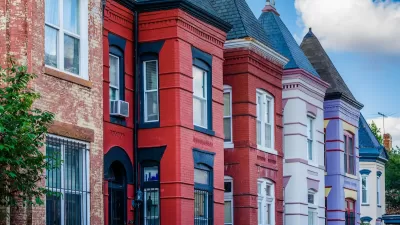The revised ordinance calls for higher density and more affordable housing.

Writing in The Cavalier Daily, Brandon Kile outlines the new zoning ordinance passed by the Charlottesville City Council, which “will allow for greater diversity in types of housing as well as require the inclusion of affordable housing in some future developments.”
The ordinance calls for higher housing density on commercial corridors and a 10 percent affordability requirement for buildings with ten or more units.
“By building more homes within city limits, we can make progress on our goals of bringing down housing costs, shortening commutes, reducing car dependency and helping the environment,” said Council Member Natalie Oschrin.
The ordinance is facing opposition from some residents who say the council did not fully consider the impacts of the new law. According to Oschrin, “I understand that people can be afraid of changes, but this is a historical correction to housing policies that were founded in racism and designed to perpetuate economic inequity,” adding that residents should “be excited about the future” of Charlottesville.
FULL STORY: New zoning ordinance garners mixed reactions from the Charlottesville community

Maui's Vacation Rental Debate Turns Ugly
Verbal attacks, misinformation campaigns and fistfights plague a high-stakes debate to convert thousands of vacation rentals into long-term housing.

Planetizen Federal Action Tracker
A weekly monitor of how Trump’s orders and actions are impacting planners and planning in America.

In Urban Planning, AI Prompting Could be the New Design Thinking
Creativity has long been key to great urban design. What if we see AI as our new creative partner?

King County Supportive Housing Program Offers Hope for Unhoused Residents
The county is taking a ‘Housing First’ approach that prioritizes getting people into housing, then offering wraparound supportive services.

Researchers Use AI to Get Clearer Picture of US Housing
Analysts are using artificial intelligence to supercharge their research by allowing them to comb through data faster. Though these AI tools can be error prone, they save time and housing researchers are optimistic about the future.

Making Shared Micromobility More Inclusive
Cities and shared mobility system operators can do more to include people with disabilities in planning and operations, per a new report.
Urban Design for Planners 1: Software Tools
This six-course series explores essential urban design concepts using open source software and equips planners with the tools they need to participate fully in the urban design process.
Planning for Universal Design
Learn the tools for implementing Universal Design in planning regulations.
planning NEXT
Appalachian Highlands Housing Partners
Mpact (founded as Rail~Volution)
City of Camden Redevelopment Agency
City of Astoria
City of Portland
City of Laramie





























